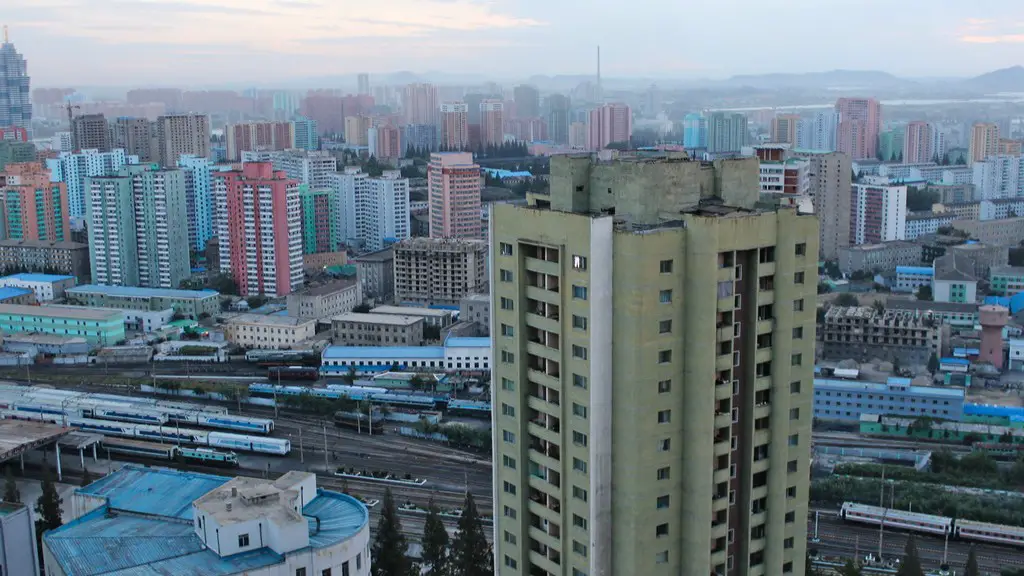The potential of an armed conflict between America and North Korea has been looming over the international community for years now, and while the odds of war have significantly reduced recently following a breakdown in talks and the introduction of diplomatic measures to contain Pyongyang’s nuclear ambitions, the nuclear issue is still causing mounting international tensions as both countries continue to contemplate a military intervention as a last resort.
In April 2018, US President Donald Trump declared that America was ready to act against North Korea unilaterally if necessary, hinting at a potential nuclear strike. However, the reality is that there are several constraints that prevent both sides from engaging in hostilities.
On the one hand, American military planners have expressed concern over the ability of Pyongyang to launch a devastating strike against US territory with its nuclear-armed intercontinental ballistic missiles (ICBMs). The US Department of Defense has said that North Korea possesses ICBMs capable of reaching the continental United States, although these missiles are not yet capable of carrying warheads. Some experts estimate that North Korea will not be able to achieve full nuclear capability until 2020, by which time it would be possible for the regime to hit the US mainland with a nuclear-armed ICBM.
Even if North Korea was able to launch a nuclear strike on US soil, current US defence protocols would be likely to stop it in its tracks. America has developed a comprehensive missile defence system known as the Ground-based Midcourse Defense (GMD) system. The GMD system is designed to intercept and destroy ballistic missiles in their mid-course, allowing the US to neutralise any North Korean attack before it can cause significant damage.
However, experts have warned that the GMD system is not fail-proof and that North Korea may be able to launch a nuclear attack against a US port city, such as Seattle, that is not currently defended by the GMD system. It is also possible that North Korea could launch a nuclear attack against US allies, such as South Korea and Japan. In response, the US could respond with a massive retaliatory strike, triggering a cycle of destructive escalation.
Meanwhile, the US has stepped up economic pressure on North Korea in order to deter it from launching a nuclear attack. US sanctions have crippled the North Korean economy, forcing Pyongyang to the negotiating table in search of economic relief. However, it remains to be seen whether these economic measures are enough to dissuade the North Korean leadership from taking a dangerous path to nuclear armed conflict.
North Korea’s Nuclear Weapons Programme
The nuclear ambitions of North Korea have been a source of worry for the international community for years. Although the country conducts regular military exercises, the intensity and frequency of these tests have increased drastically since the late 1990s. The North Korean regime is thought to possess at least a dozen nuclear weapons, as well as a number of ballistic missiles, although the exact number is unknown.
The North Korean nuclear weapons programme is estimated to cost around $3 billion to maintain, according to some estimates. This figure is a small fraction of the North Korean GDP, suggesting that the regime is willing to endure huge economic hardship in order to pursue its nuclear ambitions.
North Korea has a history of provocative actions against its regional neighbours. In March 2016, the regime fired two nuclear-capable intermediate-range ballistic missiles (IRBMs) over Japan in defiance of UN sanctions, causing international condemnation.
In the event of war, the US would almost certainly be the primary target of North Korean missiles and nuclear weapons. Pyongyang has a history of attacking US military and economic interests abroad, and has a history of issuing threats to the US mainland. This has exacerbated fears in Washington that the regime may be tempted to use its nuclear capabilities in a conflict with the US.
The Probability Of War
Although the threat of war between the US and North Korea is still significant, the probability of a full-scale military conflict has greatly decreased in recent years. Both sides have committed to negotiations in order to find a diplomatic solution to the nuclear issue and have agreed to the suspension of all hostile activities.
However, despite these diplomatic efforts, North Korea’s nuclear programme remains active and unabated, raising the prospect that it could resume its weapons development if talks fail to yield concrete results. As a result, the odds of war remain higher than they were before, although a full-scale conflict is still considered highly unlikely.
One possible outcome of the current diplomatic process is a denuclearization agreement in which both sides agree to the dismantling of their respective nuclear weapons programmes. Such an arrangement could potentially ease international tensions and help to reduce the risk of a nuclear conflict.
Another possible outcome is that the current standoff between the US and North Korea continues indefinitely as both sides maintain their positions indefinitely. This could lead to further economic and diplomatic pressure on North Korea and further erosion of trust between Washington and Pyongyang.
What Role Does China Play?
China has long been seen as the key to resolving the North Korean nuclear issue, and its role in the current crisis has been significant. Beijing has sought to act as a mediator between the two sides and has hosted a number of high-profile diplomatic meetings in an effort to bring a peaceful resolution to the situation.
China has also maintained a strong economic relationship with North Korea, providing the regime with much-needed economic assistance. This assistance has served as a powerful deterrent to North Korea, discouraging it from taking drastic actions that would further destabilise the region.
In the event of war, China would be most affected by the consequences. Chinese leaders have repeatedly stressed the importance of maintaining peace in the region and have made clear their opposition to any military action against North Korea.
At the same time, China has sought to pressure Pyongyang to abandon its weapons programme, suggesting that it may be willing to use its extensive influence to achieve a denuclearisation agreement between the two sides.
How Would A War Affect The Region?
The outbreak of a war between the US and North Korea would have devastating consequences for the region. The economic cost of the conflict would be enormous, and it could potentially lead to an all-out nuclear war between the two sides.
In addition, the destruction of North Korea’s weapons sites would likely result in a catastrophic environmental disaster, with nuclear fallout from the explosions spreading across the region. The destruction of infrastructure, such as bridges and roads, would also prevent aid from reaching those in need.
The aftermath of a war would also be devastating for South Korea, which would suffer heavy casualties and economic disruption. Seoul would also be vulnerable to attack from North Korean forces, as it is located close to the North Korean border.
Japan is also likely to be severely affected by a potential war, with the islands at risk of being hit by North Korean missiles. Japan’s military is capable of defending itself against North Korean missiles, although it is unclear if it would be able to stop a nuclear strike.
International Impact Of A War
If a war were to break out between the US and North Korea, the consequences would be felt around the world. International trade would suffer a severe blow, as the US and its allies would likely impose further economic sanctions on Pyongyang in an effort to contain the conflict.
The US would also likely call for international support for its military campaign against North Korea, which could result in a further increase in tensions between the US and its traditional enemies, such as Iran and China.
International organisations, such as the United Nations, would also be affected, as they would be forced to manage the political fallout from the conflict. The UN Security Council, for instance, would be required to impose further sanctions against North Korea and to manage the distribution of aid to the victims of the war.
Finally, the world would be forced to grapple with the humanitarian consequences of a war. The conflict could potentially lead to widespread suffering among the North Korean population and the displacement of millions of people.
Conclusion
Despite the efforts of the international community, a potential war between the US and North Korea still looms on the horizon. Although a full-scale conflict is seen as highly unlikely, the threat of a nuclear-armed North Korea remains real. The international community must continue to pursue diplomatic solutions to the crisis in order to avert the disastrous consequences of a war in the region.





